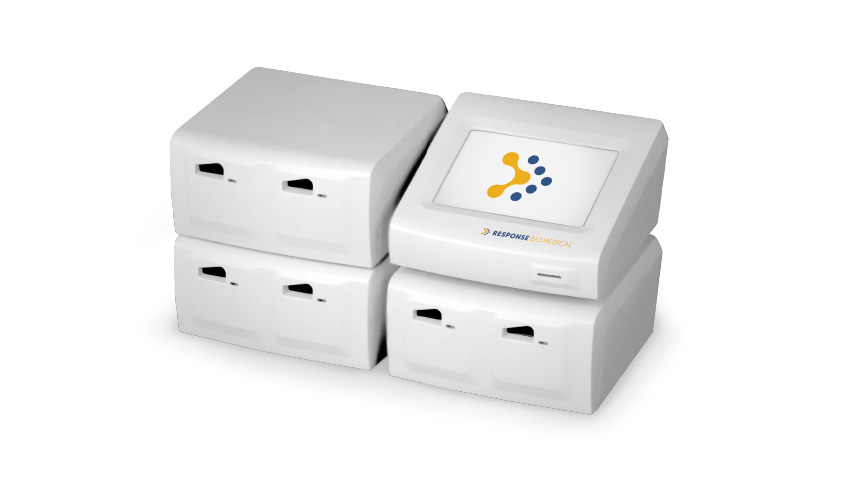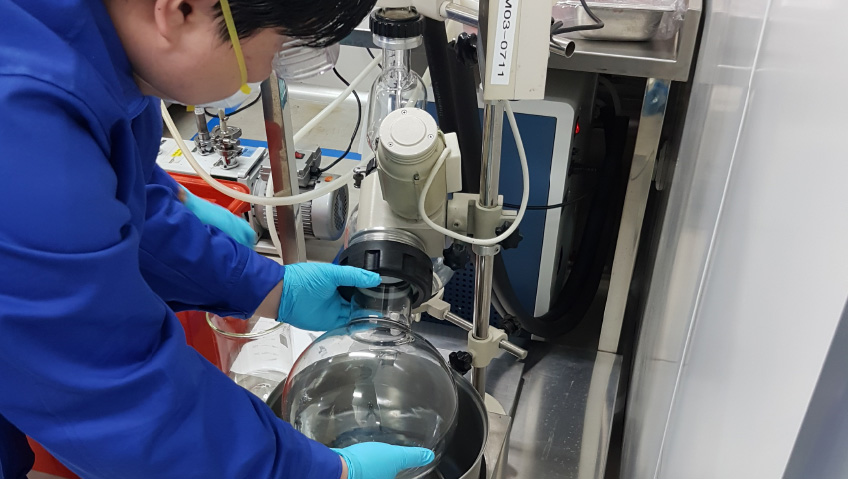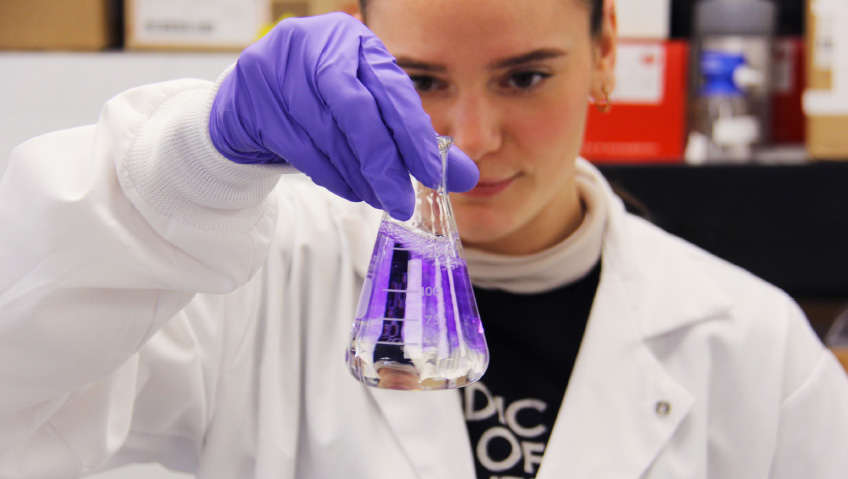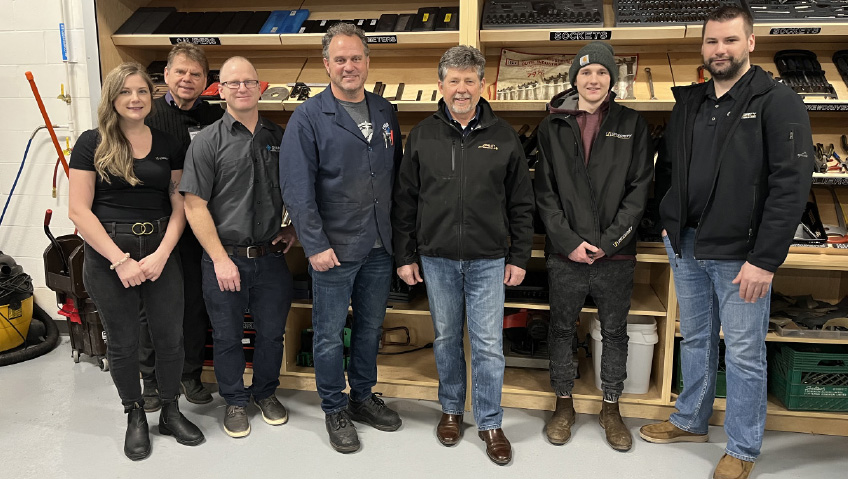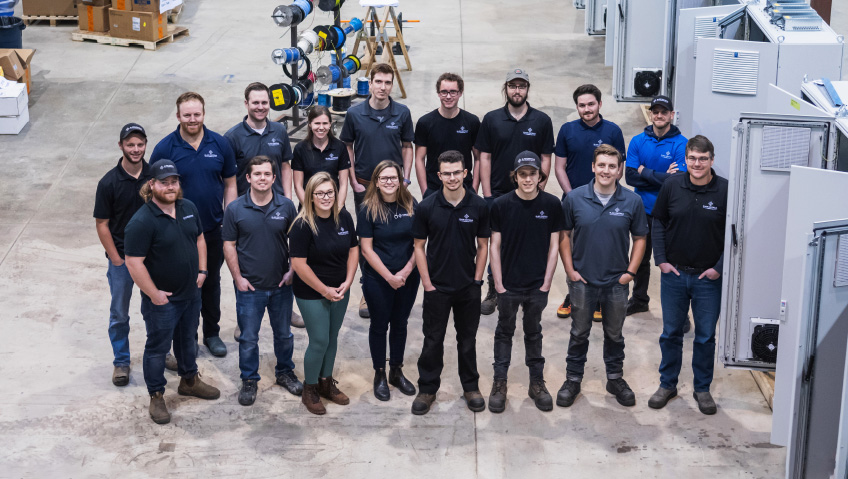Response Biomedical Corp. (Response) is a market leader in comprehensive acute care testing. It is a well-established, thriving Canadian company with full operations—including all manufacturing—based in Vancouver, B.C. Response competes in the in-vitro Diagnostic (“IVD”) market globally and its RAMP system is a fast diagnostics platform offering lab-quality performance in acute care settings.
The system tests for a wide range of biomarkers including Troponin I, CK-MB, Myoglobin, NT-proBNP, D-dimer, and Procalcitonin. These RAMP tests assist in the diagnosis of conditions such as acute myocardial infarction, heart failure, and sepsis for effective and efficient patient management.
Response designs, develops, and manufactures a platform technology that can be used to detect environmental, viral vectors, and disease biomarkers from a small volume of fluid in just 15 minutes, aiding in the diagnosis of life-threatening conditions for both the laboratory and near-patient testing markets in more than 40 countries worldwide.
The RAMP platform is based on gold standard immunochromatography technology coupled with highly sensitive fluorescent detection; the system delivers quantitative results from a small drop of blood that aids and enables healthcare providers to rapidly triage patients in a wide range of settings and helps improve operational efficiency. Historically, the value of traditional point-of-care testing (POCT) has been limited due to the visual inspection needed for the rapid tests commonly used, their qualitative nature leading to subjective interpretation, and the lack of data storage capabilities for integration of test results into Electronic Medical Records. To overcome these numerous challenges, the RAMP instrument was designed for ease of use, lab-quality quantitative results, connectivity, compliance, and the ability to be networked to all major laboratory and hospital information systems. In fact, Response has global regulatory clearances for a wide range of tests that aid in the diagnosis of multiple life-threatening conditions caused by cardiovascular disease, infectious disease, or sepsis.
The original platform and diagnostic biomarker testing strategy was defined in the late ‘90s, and while the company was focused on developing cardiac biomarker tests, Response was unfortunately hit by the downturn that followed the 9/11 tragedy.
Starting in 2002, in a post 9/11 world, Response launched its RAMP platform into the biodefense market with the introduction of a test for on-site detection of Anthrax; subsequent tests for Ricin, Botulism toxin, and Small Pox were launched in the following months. Response expanded its offering into infectious agents when it introduced a West Nile Virus (WNV) test for the detection of the virus in mosquitos, the primary vector for the virus. In fact, even today, this ability of the team to be agile and pivot to market shifts in such a successful and continual fashion remains a key element of the company’s culture today.
While the commercial launch of the RAMP biodefense and WNV tests helped gain traction in non-clinical settings, Response’s focus remained on the near-patient diagnostic testing market with the aim of improving diagnosis at the point of need. Response received Health Canada and FDA clearance for its first acute care test (Myoglobin) on the first generation RAMP Reader in 2004 followed by the launch of Troponin I and CK-MB tests; together, these cardiac markers positioned Response to aid in the diagnosis of heart attacks. In 2007, in close collaboration with Roche Diagnostics, another key test was developed for aid in the diagnosis of congestive heart failure (NT-proBNP).
Response later developed a higher capacity instrument, the RAMP200, with the ability to run up to six tests in parallel; the system was configured to meet the needs of a wide range of settings from small physician’s office labs to high-volume laboratory settings. This directly addressed a market need where competitive systems had a throughput of a single test at a time. Due to its unique modular design where one, two, or three testing modules could be connected to a central control module, the RAMP200 is able to increase capacity without the need to purchase a new system. This allows the RAMP system to grow as the customer’s testing needs increase.
The RAMP200 control module also addresses common connectivity issues with near-patient testing and data storage / transmission. The system boasts enhanced security features as well as the ability to connect to any Laboratory Information System (LIS).
Response has validated its ability to develop, manufacture, and sell point-of-care solutions in a very competitive and complex global diagnostic market. While committing to maintaining all production in British Columbia (B.C.), the company differentiates itself by integrating its development, manufacturing, and regulatory teams to produce high-quality solutions at a low cost. Further, Response has established a worldwide network of channel partners that act as an extension of itself in their individual market. With a shared commitment to deliver the best global customer experience and trusted, high-quality tests, Response can be competitive against significantly larger competitors.
The clinical laboratory testing world is constantly evolving; many cutting-edge technologies common over the past 10 or 15 years have become old-fashioned and obsolete. Response must not only be dynamic but constantly pivot to bring new technology to market. To that end, the company routinely recruits the best and brightest talent from today’s technology space in B.C. by collaborating, teaching, and engaging various academic institutions; this allows the company to reach out directly to students and faculty interested in diagnostics. The company looks broadly for talent in the U.S., Canada, Europe, and beyond.
The company also understands the importance of investing in R&D growth since it has received more than $6 million in government grants, subsidies, and sponsorships over the past five years while continuing to explore options across the U.S. and Canada. Growing its people and promoting talent from within is a cornerstone of any company’s evolution; Response believes that to grow, the company must improve team skills and experiential leadership training.
Response knows that clinical testing continues to migrate from the core laboratory to more near-patient applications. If COVID-19 taught the industry anything, it’s that rapid diagnostic testing does work in the immediate hands of patients and doctors. As such, Response must continually stay abreast of practices and procedures utilized in emergency departments and Intensive Care Units so that RAMP products become the obvious choice for hospitals around the world. This means educating employees, customers, suppliers, and collaborators on the company’s products and how adaptation is necessary to stay relevant in today’s market and tomorrow’s clinical world.
Being a proud and active part of B.C.’s life sciences and biomanufacturing community means Response can leverage its expertise and learn from local life sciences teams on best practices in its industries. Life Sciences BC, a not-for-profit organization, ensures that best practices and key relevant topics are discussed and provides networking opportunities to support the growth of the community.
Response’s CEO, Dr. Barb Kinnaird, currently serves as Chair of the Board of Acetech, a local not-for-profit organization designed by CEOs to help CEOs grow and scale tech businesses. This stimulates the economy through job creation and global expansion. Dr. Kinnaird also sits on the Advisory Committee for Genome BC, a not-for-profit organization that invests in local start-ups and SMEs to drive commercialization activities. Finally, Response has been an active partner in collaboration with B.C.-based colleges, universities, and industrial partners.
Under Dr. Kinnaird’s leadership, Response established a “big hairy audacious goal” (BHAG) of being the “diagnostic brand of choice where lives are at risk.” The company has systematically moved forward by establishing annual milestones toward that goal, and this year, Response’s immediate vision was to expand its menu in some of the biggest markets in the world. There has also been a strong push to complete clinical trials on key products to help solidify its offering in these markets and beyond.
Expansion into other key markets in addition to growth in its current markets requires a continued focus on the customer experience and evolving the product menu. For example, Response has leveraged its more than 20 years of experience in cardiac testing to make excellent progress on the development of a high sensitivity Troponin I assay that can meet American Heart Association (AHA) guidelines. Response believes these steps over the next three years will help establish the company as a dominant player globally in this emerging space.
Beyond 2025, there will be continued migration of current core laboratory testing to other channels in the health care space, while technologies that can be adaptable to doctors’ offices, ambulances, pharmacies, and specialized care centers will thrive. This will lead to a crowded diagnostic space as many companies envision this same migration. Companies that can offer higher value testing—multiplexing, faster assays, simpler sample collection, lower costs—will be most attractive and consequently thrive. For this reason, Response is focused on adding this type of value for its next-generation technologies that expand upon its current legacy offering.
There are challenges, of course. The menu of the RAMP platform includes key assays—Troponin I, D-dimer, PCT, NT-proBNP, Myoglobin, CK-MB, and Total β-hCG—that have regulatory clearance in most international markets and are in widespread use. There are, however, some assays that require more extensive clinical trials to achieve clearance in new territories, including extensive clinical trials at the point-of-care. These clinical trials can be cost-prohibitive when performed; however, with a shift in the market from contemporary Troponin testing to new high sensitivity Troponin assays, Response has the opportunity to provide one of the few point-of-care assays with this capability. This positions Response extremely well in its existing markets and revolutionizes the point-of-care testing paradigm for chest pain and patients suspected of heart attack.
Along with these challenges there are many goals that have been set by the company including the development of a focused strategy on the acute care market and completing the product test menu to accommodate the needs of those customers. Response will need to implement key industry-standard manufacturing processes to ensure RAMP continues to deliver reliable test results as the company continues to scale. This will ensure that healthcare providers achieve highly accurate results in high-stress medical environments where lives are at risk.
Finally, Response continues to build a culture empowering innovation, thinking, and open communication. It does this by driving commercial growth through a partner-focused strategy in emerging markets, streamlining operations to maintain high efficiency that maintains manufacturing in Canada, developing a brand promise around responsive service, and utilizing a team of subject matter experts that support customers with immediate information and answers.

